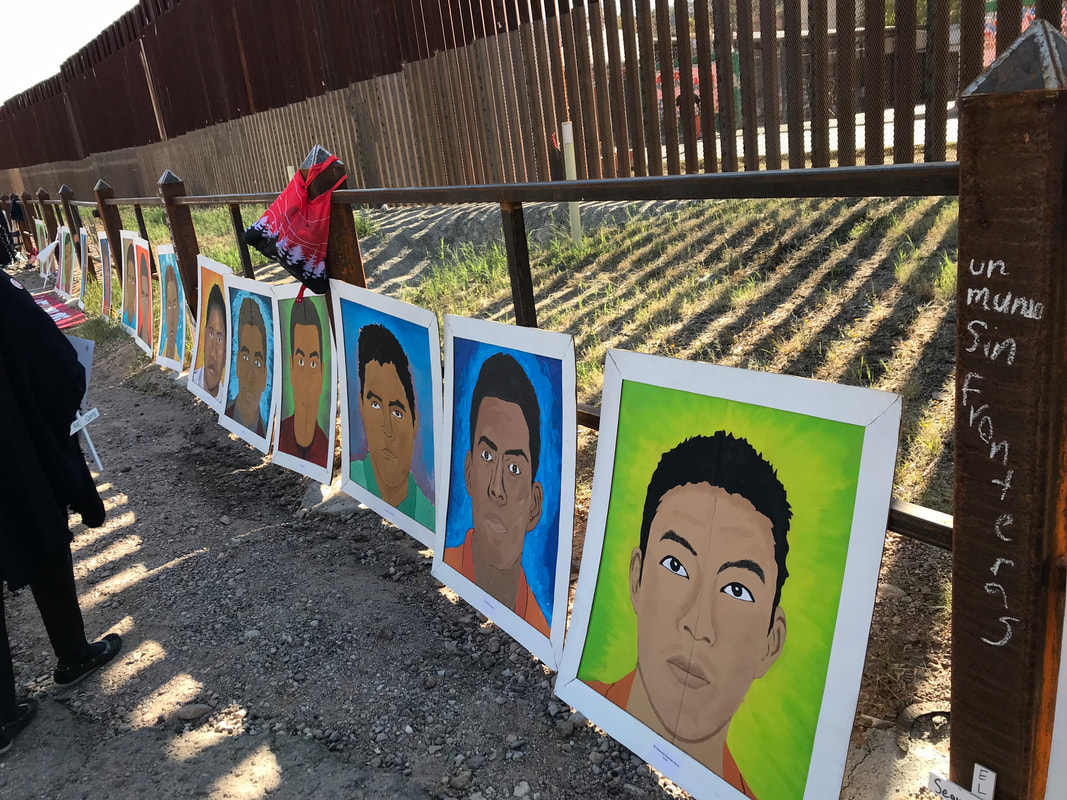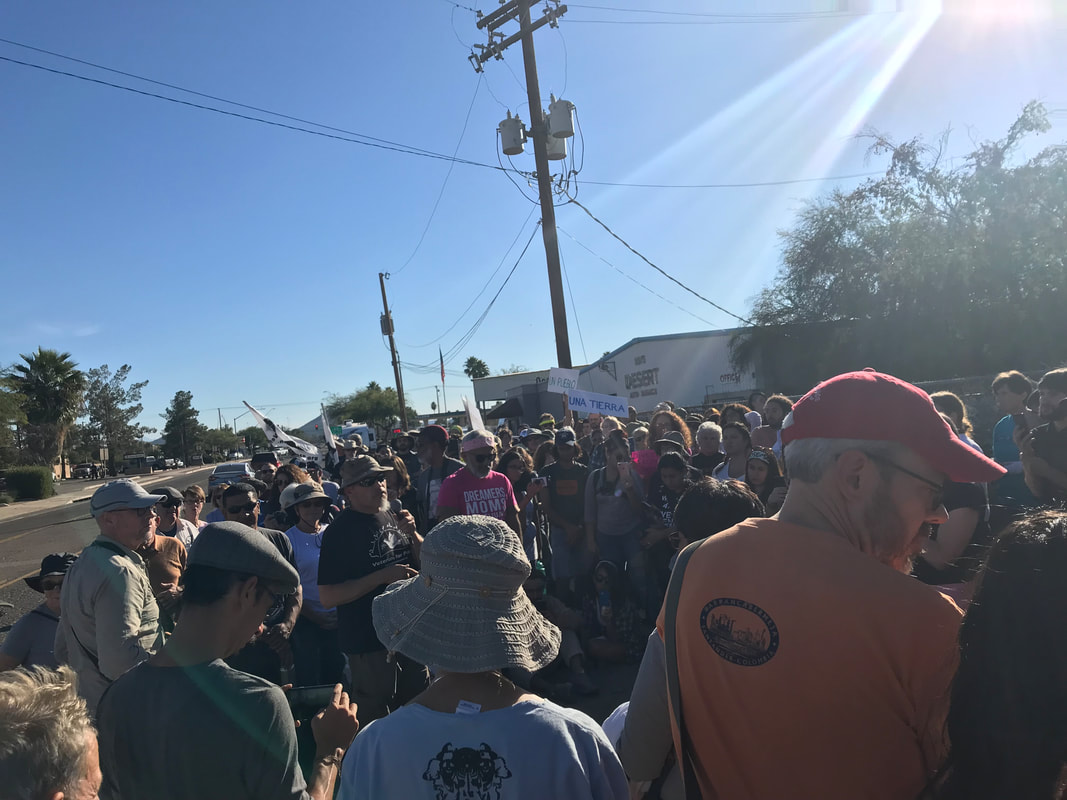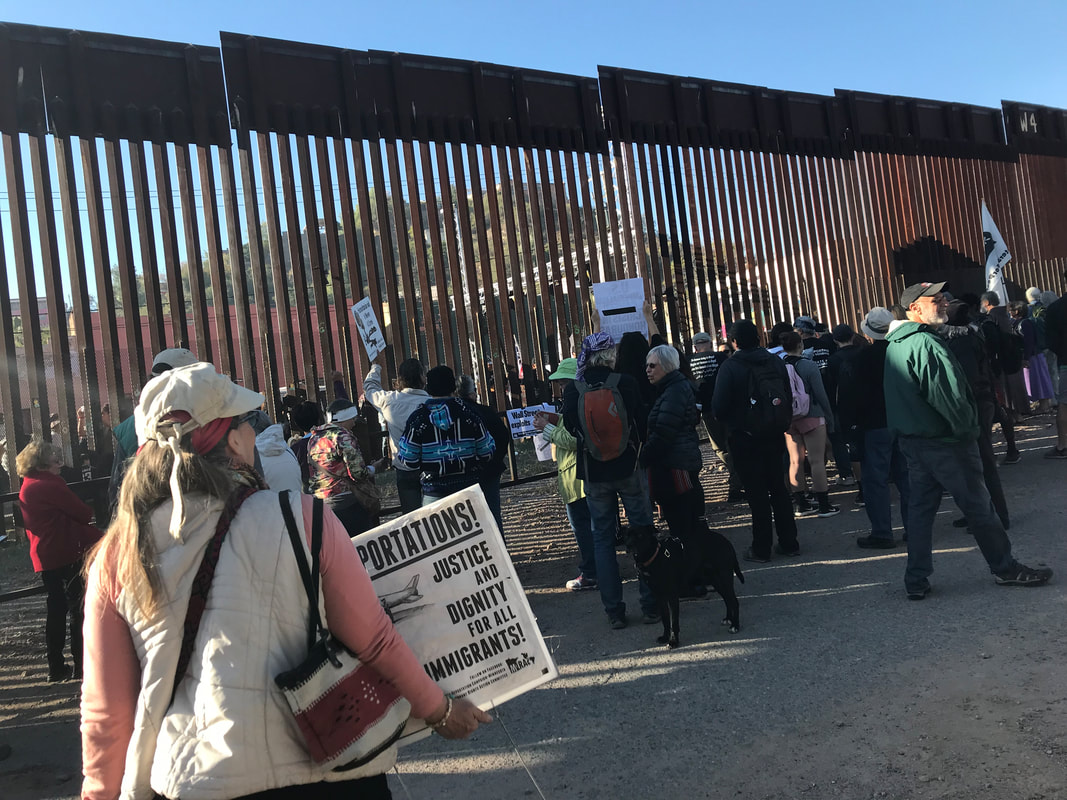|
BY ISABEL NGO
I’ve always considered myself a little weak. I don’t exercise very often. I get cold easily. My back and limbs cramp up way more than they should after I sleep in a weird position, or even after a night of dancing. But what I lack in physical strength among the volunteers I live with, I make up for with my attention to detail, particular tech and gadget know-how—from using Twitter to handling our old fashioned can opener, and of course, by disposing the house’s occasional roaches. Not to mention what I’ve been learning at Villa María (my volunteer placement), it’s been a period of small personal victories since moving to El Paso, TX from my home in California.
Last weekend on Nov. 16-18, my housemates and four other Loretto Volunteers drove to Nogales, Arizona to join the SOA Watch protests. The US Army School of the Americas, today renamed WHINSEC and known to others as the “School of the Assassins,” is an institution funded by the U.S. government and that has taught terror and torture techniques to international soldiers. SOA-graduates have been responsible for the deaths of many civilians. In 1980, they murdered Archbishop Oscar Romero for opposing the U.S.-backed civil war in El Salvador and raped and killed four churchwomen who arrived in El Salvador to assist with humanitarian aid. In 1989, six Jesuit priests and Celina and Elba Ramos—the women who worked at the Jesuit residence at the University of Central America—were shot by Salvadoran soldiers trained at SOA as well.
Besides various rallies for student justice at my college, I had never attended a public protest or march before SOA Watch. I was worried about the crowds, the unfamiliarity, and how long the protests would last. But on Friday afternoon, joined by Sisters of Loretto, fellow volunteers, Veterans for Peace, college students, local youth and activists of all ages, I found myself walking outside the Milkor USA arms manufacturing facility, holding a sign that read “No Borders, Refugees Welcome” and responding to the shouts of the protest organizers.
“Hey Hey, Ho ho!” “Milkor’s got to go!” We rallied at Milkor USA, an arms manufacturer in Tuscon, AZ that has sold weapons and explosives to military forces in Mexico.
Later that day, we visited “the deadliest detention center in the country” and joined the rally in front of Eloy Detention Center. Former detainees of Eloy spoke on the lack of health services in the centers, the unsafe living conditions, and the cruelty of and abuse perpetrated by the guards through beatings and solitary confinement. We sang protest songs with a visiting brass band, prayed together, and as the night descended, marched closer to the sidewalk in front of the detention center. “This is for our families who are locked inside, together we will abolish ICE,” the crowd sang. We were told if we were loud enough, the people inside the detention center would be able to hear us. Despite the long hours we drove that day, the cold desert winds blowing, and the parked police cars shining their lights into our eyes, we stood in front of the detention center chanting “No están solos!” You are not alone. When one of our voices gave out from shouting, we’d hear others around us continue with fervor. At our loudest, strongest points, we saw silhouettes of the detainees in the windows, and they flickered the lights in their rooms on and off in response to our presence outside.
The Peace Poets led many protest songs at the Eloy Detention Center vigil. “This is for our families who are locked inside, together we will abolish ICE,” we sang.
This year’s SOA Border Encuentro fell on the death anniversaries the six Jesuits, and the protests, workshops, and gatherings of music and solidarity throughout the weekend brought even larger political context to the forefront. The continual violence and militarization along the U.S./Mexico border and the discrimination and suppression of civilian, migrant, and human rights groups in Honduras, Guatemala, Colombia, Chile, and Brazil are all connected to U.S. intervention and military power.
When we stood at the border wall between Nogales, Arizona and Nogales, Sonora in Mexico we held crosses to remember all those disappeared and killed along both sides of the border. The litany of the names of the deceased lasted for over an hour, and for every name and age given, there were several more chants for each “unidentified male” or “unidentified person.” One of these names was José Antonio Elena Rodríguez, a 16-year-old who was walking home when he was shot 10 times and killed by a border patrol agent who accused him of throwing rocks at officers. This past Wednesday, Nov. 21, Tucson jurors found the border patrol agent not guilty of the 2012 killing, and the family and community of José Antonio has not received justice.
It’s hard to condense all the emotions and everything I learned into one concise blog post. I could talk about the hard work that small non-profits like Colibrí Center for Human Rights and the Detained Migrant Solidarity Committee are doing on the frontlines of immigration justice. I could talk about the emphasis SOA Watch organizers placed on learning from the families of the disappeared and supporting them by lifting up their voices and raising awareness—rather than exploiting their pain through mere curiosity or disbelief. I could talk about the anger, hope, vision, and determination that fueled all the participants when we sang our protest songs. Or about how grateful and strong I felt to be a part of the beautiful gatherings at ugly, looming, rust-colored border wall. There is still much to educate ourselves about, but I cried and I believe: None of us are alone.
We gathered at the border between Nogales, AZ and Nogales, Sonora, Mexico for the SOA Watch opening and closing ceremonies. On the Mexico side, organizers set up a concert stage for speakers and musicians. The wall cannot separate us!
Isabel Ngo graduated from Loyola Marymount University with a B.A. in Theatre Arts and minors in English and Studio Arts. During her time at LMU, she wrote for the university newspaper The Loyolan and volunteered with Ignatians Service Organization. This year, Isabel has been working as the Housing and Employment Counselor at Villa María, a transitional shelter for homeless women in El Paso, Texas. In her spare time, Isabel enjoys drawing, reading comics, and writing poetry.
3 Comments
BARBARA NICHOLAS
11/27/2018 06:10:54 pm
Oh, Isabel, I think you are very strong. Thank you for standing so bravely, and singing, and for sharing your experience.
Reply
Claudia Calzetta
12/2/2018 09:53:36 am
Isabel
Reply
Stacy Fitzwater CoL
12/9/2018 11:02:09 pm
Thank you for crafting such a beautiful reflection after a weekend full of emotions. You did an excellent job capturing the presence of hope, as well as so many of the important pieces of information we learned while there. I hope our paths cross again. Keep doing the good work!
Reply
Your comment will be posted after it is approved.
Leave a Reply. |
In Their Own WordsWe invite you to get to know Loretto Volunteers and the program here. Volunteers introduce themselves and reflect on their experiences. |




